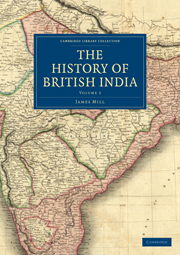Summary
The state of the regulations for collecting the revenue had for some time pressed upon the attention of the government. The lease of five years, on which the revenues had been farmed in 1772, was drawing to a close, and it was necessary to determine what sort of course should then be pursued. To remedy evils, which delayed not to make themselves perceived, in the regulations of 1772, a considerable change had been introduced in 1773: The superintendence of the collectors was abolished: The provinces (Chittagong and Tipperah remaining under the original sort of management, that of a chief) were formed into six grand divisions, Calcutta, Burdwan, Moorshedabad, Dinagepore, Dacca, and Patna: In each of these divisions (Calcutta excepted, for which two members of the council and three superior servants, under the name of a committee of revenue, were appointed) a council was formed, consisting of a chief and four senior servants, to whom powers were confided, the same, in general, with those formerly enjoyed by the collectors: They exercised a command over all the officers and affairs of revenue, within the division: The members superintended in rotation the civil courts of justice, called Sudder Adaulut: The councils appointed deputies, or naibs, to the subordinate districts of the division: These naibs, who were natives, and called also aumils, both superintended the work of realizing the revenue, and held courts of fiscal judicature, called Courts of Duanee Adaulut: The decisions of these courts were subject by appeal to the review of the provincial courts of Sudder Adaulut; which decided in the last resort to the value of 1000 rupees, but under appeal to the Court of Sudder Duanee Adaulut at Calcutta, in all cases which exceeded that amount.
- Type
- Chapter
- Information
- The History of British India , pp. 385 - 420Publisher: Cambridge University PressPrint publication year: 2010First published in: 1817



